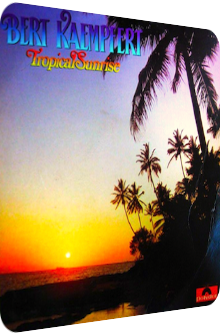
Bert Kaempfert
Tropical Sunrise
1977
Bert Kaempfert (1923–1980) delivered his best albums in the 70’s. That’s my opinion, and it is underlined by Tropical Sunrise, released in 1977. 20 years after the launch of the Exotica genre, Kaempfert teams up with his permanent band member and close friend Herbert Rehbein (1922–1979) on a whopping six tracks out of twelve, all of them fresh and unique takes.
The style of this album is definitely Easy Listening by nature with added big band elements like weighty brass sections. And though this album is oftentimes overly melodramatic and syrupy, I am in fact embracing the particular overarching theme. The brass ensemble plays it smooth, while eupeptic flutes, humming choirs and gentle percussion are all used as underlining elements of the most important superstructure the album has to offer: gorgeous melodies. Be it Kaempfert’s and Rehbein’s unique compositions or their interpretations of popular Brazilian songs, the interplay of quiet passages with the enormously euphonious flourish is the high point of this release. In various moments, Kaempfert even manages to break the Easy Listening formula, either by adding darker bits that are washed away immediately or by presenting equally short annealing moments of pure bliss that make you ponder for a few moments how supposedly Easy Listening compositions – the expelled genre of the music world – can be so utterly beautiful despite the plain, fuss-free nature. Find out more about Tropical Sunrise below, and why you should consider a lot of the album’s tunes.
Footprints In The Sand (Huellas En La Arena) is the first of many tracks co-written by Kaempfert/Rehbein, all of them expanding the theme of the album by being, well, new and unique. The most surprising element are the persistent key changes which oscillate between sad undertones in minor and sudden solemnity in major. One of the later Kaempfert signatures, a melodramatic female singer, can be found juxtaposed to echoey castanets, majestic brass players and a gorgeously soothing backing choir, providing the right dose of warmth to the melancholia. The acoustic guitar on which the track is based is audible all the time. Easy Listening by the numbers, but well-produced and heavy enough to put it on top of a lot of likeminded tracks.
Dreams (Sueños) finds Kaempfert and Rehbein in an upbeat string-heavy dreamland whose conviviality is realized by effervescent flutes, little glockenspiel droplets here and there and various intertwined brass melodies whose dark bursts form a high-octane counterpoint to the phantasmagoric atmosphere. In the realms of Easy Listening, these tiny fragments of mild gloominess are the most frightening elements you can possibly encounter in the genre. Another surprise which shows that this kind of music doesn’t need to be streamlined and whitewashed all the time. Your Move (Tu Movimiento) closes the triptych of the two writers with a quirky La Bamba-esque offering that consists of staccato brass sections, their sustained foils in the background and vivid percussion upfront. Say what you will, but this is the essence of Easy Listening with no surprise, not even a little shock or a pinch of duskiness – taking the title of the album into account, this should have been expected by the listener anyway.
Andorinha Preta (Brazilian Love Song) by Breno Ferreira is the first rendition of the album. Originally composed in 1932, it is reincarnated quite well in Kaempfert’s version. Distinctly similar to the typical Herb Alpert setup of bubbling brass eruptions, a male ooh-ooh backing choir is complemented by a slightly more prominent female choir of the aah-aah kind until both choirs merge, thus building a rapturous superimposition that is boosted by especially towering trumpets that glow and gleam. The title-giving Tropical Sunrise is yet another Kaempfert/Rehbein tune that somehow manages it to add further pompousness to an already majestic buildup: warm violin strings and auroral woodwinds grow louder until they collapse and make room for a luxurious string scenery complemented as usual by a choir plus blurry brass mellowness in the back. After this high point, an acoustic guitar becomes the base frame of the track with an advecting solo trumpet and cascading string washes who provide a little bit of drama in an otherwise paradisiac song.
Cachaca Mecanica by Roberto & Erasmo Carlos is the first strict Latin song of the album that presents the typical tone sequences in a hot-blooded Tango groove full of the lamenting heaviness that is so typical for kitschy Latin tunes, while Harry Belafonte’s Jump In The Line is an exhilarative big band instrumental version of the well-known Samba tune with both balmy and enthusiastic brass sections, a blithesome marimba-flute coupling and the omission of any dark cloud that would spoil the faux-Calypso feeling. Shades Of Love (Sombras De Amor) is the penultimate joint venture between Rehbein and Kaempfert and an unexpectedly silky tune with a strong inclusion of various James Last characteristics: the brass instruments are tremendously mellow with all their punchiness gone for good on this song, the warm euphoniousness in these sections is even stronger than on any other track, and the short, reduced interludes with short horror-movie like violin bursts form a great counterpart to the saccharine enamel. A sunset-evoking piece of ephemeral goodness, I have to admit.
The paragon of many an Exotica composer must not be missed on this album, and that’s why a composition by Antonio Carlos Jobim called Wave is included as well, providing the strongest feeling of vintage Exotica of all the 12 tunes due to the laid back way the attention-craving alto flute is played and complemented by eminently technicolored cascades of violin strings whose exhilaration and tonal qualities are fantastic, making Wave the best track off Tropical Sunrise and one of my essential picks. It is Easy Listening, true, but an interpretation that is able to enchant the listener despite his or her knowledge of the evanescent bliss. Still, this is my top pick!
While Canto De Ossanha by Vinícius de Moraes is presented in a swinging version with short spy theme-like brass backings, a monotonous sustain of an alto flute and a terrifically coruscating showtune-like refrain that evokes that certain cosmopolitan feeling of Brazil, Swing And Sway is the last composition of Kaempfert and Rehbein on this album with an ostentatious brass ensemble in the background that deliberately restrains the true power of their instruments in favor of a golden shimmering style of pleasant anticipation, and sure enough, the track soon morphs into a glittering fanfare of complacency, love of life and rose-tinted abundance. A terrific closing track … if there wasn’t Island In The Sun, a Balearic interpretation of another Harry Belafonte track. The acoustic guitar is the signature instrument of the track, everything else is purposefully reduced and smooth. This song is way too kitschy even for my taste, and I consider this to be the worst song of the album. A closing track to run away from, especially after the enormously good Swing And Sway.
There is something about 70’s Easy Listening that turns me on big time, but at the same time lets me wash my ears due to the sugary sweet compositions. Bert Kaempfert’s Tropical Sunrise, luckily, is one of his better albums and fully compatible to the specific needs of the Exotica crowd: a vast amount of lush flutes, pompously melodramatic background choirs, sumptuously floating strings and mellow brass instruments with an unexpected amount of slight danger attached to the first few tracks make this a superb entry that is highly melodious, languorous and restorative. There is really only one single dud – the closing track Island In The Sun – on an otherwise positively kitschy album.
On my review of Bert Kaempfert’s That Latin Feeling, I’ve stated that I tend to cherry-pick the tracks, for there are overly melodramatic compositions on each of his albums that ruin the fun for me and let me shy away. But not here, as the closing track can be easily ignored. Everything else is at least okay, or utterly gorgeous. And that’s one of the main spirits of the Easy Listening genre that is often neglected: even though the melodies tend to be simple and heartwarming, there are these short intersections of pure bliss, of utter beauty – in an ephemeral, fast moving business. This disaccord makes the genre so interesting to me, and I’m always searching for that certain moment where the strings glow brighter and more spectacular than they did before, outshining every bit of kitsch and cliché. The tracks Wave, Canto De Ossanha and the choir-heavy Footprints In The Sand (Huellas En La Arena) are three of these offerings that mesh short, beautiful moments that expand the nature of each track tremendously. It’s still Easy Listening – but with that certain twist. And it’s found many times on Tropical Sunrise. Big band Easy Listening merges with Exotica. This time, Kaempfert truly delivers.
Exotica Review 077: Bert Kaempfert – Tropical Sunrise (1977). Originally published on Jun. 2, 2012 at AmbientExotica.com.
